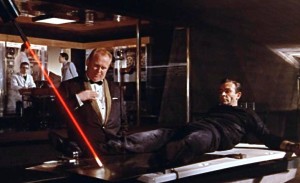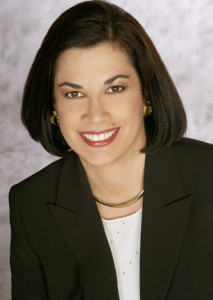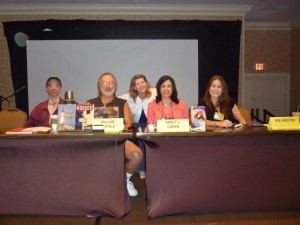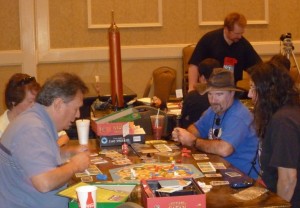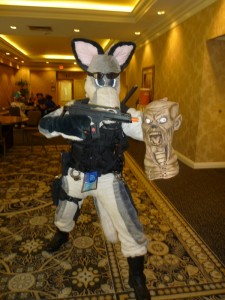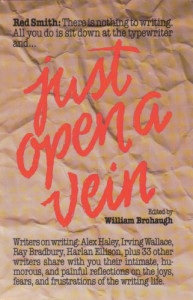Monthly Archives: November 2012
Same Book, Different Title
Self Publishing And Original Voices
Love Your Book
The first lie is that writing my novel is the most interesting thing I could possibly do. More interesting than reading anyone else’s books or watching any movies or playing any video games. This is a patent, laughable falsehood. Reading Dennis Lehane’s new book is much more interesting than writing my novel. So is watching the latest crop of movies: Lincoln, Skyfall, even Wreck-It Ralph. Playing Halo with my son is a lot more interesting than writing my novel. Or at least it would be if I could learn how to work the controls as well as he does.
I have a special problem with video games: I like them too much. Twenty-one years ago I became addicted to a game called Civilization, which I played on my 386 PC (remember those?) The game starts at the dawn of human history; you have to establish a simulated civilization by building cities and mustering armies and increasing your technological know-how. You also wage wars against competing civilizations, and over time — each turn represents a hundred years, I think — your weaponry grows ever more powerful. I absolutely loved that game. There was something intensely satisfying about starting out with phalanxes and chariots and then working your way up to riflemen and tanks and aircraft carriers.
One night in November 1991 I played the game until morning. I started playing when my girlfriend (now my wife) went to sleep, and I was still at it when she woke up at 7 am. She gave me an incredulous look. “What on earth are you doing?” I must’ve looked a little scary. My eyes were bloodshot, my hands were shaking, and my back muscles were full of knots from bending over the keyboard all night. “I did it!” I yelled in triumph. “I conquered the world!”
Later that day I removed the Civilization floppy disk (remember those?) from my computer and threw it in the trash. I realized I couldn’t allow myself to play video games of any kind, because if I did I wouldn’t do anything else. This self-imposed moratorium lasted until a few years ago when I broke down and bought a Wii system for the kids (and then we got an Xbox too). It was jarring to see the new games that have been developed over the past two decades — the graphics are so much better! But I’ve mostly resisted the compulsion to play. I’m too old to stay up all night. Besides, the kids hog the electronics now.
But getting back to my point: the world is full of entertaining distractions, and many of them would give me more pleasure than writing my novel would, at least in the short term. Yet I convince myself that this isn’t true. I put down my newspaper and tell myself, “You know what? My novel is more interesting than the CIA director’s scandalous affair. So what, the guy fooled around with a fawning younger woman, what’s so interesting about that? Come on, stop searching the Internet for lubricious details. Stop exchanging snarky e-mails with your friends. Get back to work!”
And this brings me to the second lie I tell myself. At some point in the process of writing a novel I become convinced that this book is the best thing I’ve ever written. No — the best thing ever written by anybody. Crazy, right? The lie is so absurd I can’t seriously entertain it for very long. But it’s a useful delusion to have, especially when I’m struggling with the book and the deadline is approaching and I have to devote practically every waking moment to finishing the damn thing. Why put in all the effort if the novel isn’t fantastic?
Then I finish the first draft and stop telling myself the lies. They’ve served their purpose, so I don’t have to believe them anymore. I wait a few weeks, and then I’m ready to look at the manuscript again and confront the truth: the book is a mess. Some parts don’t make sense, other parts are boring. I don’t love the book anymore. But I don’t hate it either. Now it’s time for some tough love. An intervention. I have to whip the manuscript into shape.
And then, after all the revisions are done and the final changes sent to the copy editor and the advance reading copies distributed to the reviewers, then I’m ready to fall in love with the book again. But this time it’s not a blind, self-deluding infatuation. I’ve done my best to fix the novel’s flaws, but I know it’ll never be perfect. I love the book despite its imperfections and infelicities. I’m at this stage now with my next novel, which will be published in February. I’m still collecting blurbs and composing the jacket copy, but I can’t make any major changes to the book. This stage is the literary equivalent of zipping up your lover’s dress and clasping the pearls around her neck, getting her ready for her big night on the town.
Go out there, beautiful. Knock ’em dead.
Reader Friday: Favorite Novel
Last week we asked about your favorite movie of all time. What’s your favorite novel? Or let’s put it this way: What’s the one you’d take to that fabled desert island? (If you must, you can have a couple).
But also why? What is it about this particular novel that speaks to you? What can other writers learn from it?
My Writing Nemesis & AMAZON UPDATE
Now, I bet you think I’m going to write something cute about how some of my own personal writing habits are my own worst enemy, right? Nope. The truth is, I have actual writing nemeses out there–all authors so. It’s the dirty little secret that few of us ever confess to. Because here’s the thing; when your book hits the shelves, it’s directly competing against all the other releases that week (in addition to the books that go on sale in the weeks leading up to publication, and the ones for a month or so afterward). There’s a reason that we compulsively check Amazon rankings during those critical first few weeks; many publishers keep close tabs on early sales to determine if a) they’ll continue to publish your work, and b) if you merit an extra marketing push, or if the book will be left to languish.
There is quite literally not enough shelf space for all the new releases (even less now that so many stores have shuttered); and some will get prime placement, while others are crowded together in the stacks, with only the spine showing. It takes a truly dedicated reader to turn from those table overflowing with mountains of books to a perusal of the spines. And either way, your book will only be physically present in a store for anywhere from a few weeks to, at most, a few months after publication.
Which brings me back to my nemesis. Because not only is my book competing with every other book released in the same time frame, it’s also been directly competing for marketing dollars and attention with the other books being released by my publishing imprint.
And one of those authors, unbenownst to her, is my current nemesis.
Our books were released on the same day, so keeping tabs on her sales gives me a sense of how we’re performing with regard to each other. Because there’s an excellent chance that our next books will share a release date, too. And if one of our books takes off, and the other doesn’t, when the sales and marketing team is trying to decide which novel to push in August 2013, guess which one they’ll go with?
I know authors who went ballistic when a competing major author switched to “their” release week, claiming it stole their chance to make a bestseller’s list. I’ve never gone so far as that, but I’ve certainly experienced frustration when another author with the same publisher received a marketing benefit that my book was denied.
I had a different nemesis with my debut novel, a lovely man whose own debut received the bulk of co-op placement and marketing dollars from our publisher. Oh, how I loathed him at the time. It’s really not so different from an office environment. When a good friend gets a promotion, merited or not, it’s difficult not to struggle with the green-eyed monster; especially if you felt it was a promotion you were owed. Well, it’s no different for writers. Although our water coolers are virtual, and every day is casual Friday.
And that’s our dirty little secret.
ADDENDUM: AMAZON UPDATE
I was checking my book’s pages last night, and inexplicably, DON’T TURN AROUND is suddenly listed as a paperback, not a hardcover; the Kindle version can no longer be ordered at all, and none of the books are linked on each others’ pages anymore. Maybe I’m paranoid, but this feels a lot like retaliation for my blog post about Amazon deleting legitimate reviews…
Cultural Differences
By Nancy J. Cohen
Genres matter when you attend a conference. I started out in romance, attending National RWA and Romantic Times conventions. At RWA, we dressed in business attire and wore sequins to the Awards dinner. We taught workshops or we spoke on panels where the emphasis was teaching other writers the craft and business of writing. The same was true for smaller chapter conferences held around the state and throughout the country. Editor/Agent appointments were a staple for this type of working writers conference.
Romantic Times, in contrast, was a fan convention. Here we’d meet readers, booksellers, and reviewers in a fun, party-type setting. I still dressed in business casual during the day. At night, people wore costumes to themed balls and parties. As RT attracted more writers, they added writing tracks to educate aspiring authors. Now they’ve expanded to include other genres just as RT has changed its name to RT Book Reviews. It’s still a great conference to meet industry personnel and readers.
Then I switched to writing mysteries and attended Malice, Bouchercon, and SleuthFest. What a difference! People wore jeans! There were men in the crowd! Panelists were expected to be entertaining and witty and mostly talked about their books. Bouchercon and Malice are fan conventions while SleuthFest is a writers’ conference. SF has a forensics track and workshops for different levels of writing, along with editor/agent appointments.
The one thing these events have in common? Writers hang out at the bar, the hospitality lounge, or the dealers’ room and network like crazy. Costly swag gets picked up along with candy and pens. Bookmarks and other papers lay around the promo tables like unloved orphans.
And then I attended Necronomicon, my first SciFi/Fantasy/Horror convention. Lo and Behold! Another culture shock! In many ways, this convention was similar to the mystery cons. The panels were professional and moderated by a host. Aspiring authors attended in abundance. Instead of a forensics track like at a mystery writers conference, this convention had a science track led by scientist guests. However, here’s the biggest difference: Gamers. One darkened breakout room held 3 rows of computers where people sat playing Halo. Other guys sat at round tables absorbed in role playing games.
Workshops went on into the wee hours of the night. I was scheduled to speak on three panels and had to request the organizer not to book me after dinner. Authors who paid for a spot in Author’s Alley sat at tables in a hallway and sold their own books. The Dealers’ Room was similar to the ones at mystery cons, where authors hope one of the vendors has their books for sale or else we make a consignment deal. I noted only one bookseller at this convention. Most of the vendors sold jewelry, games, and other knickknacks.
All in all, this conference was a valuable introduction to an entirely new audience. The panels were interesting as well as stimulating, and parties ranged into the night if you were so inclined. Check out my personal blog for more photos and reports on the panels I attended. Keep in mind that this was not like the big SciFi cons where TV and movie stars attend and people roam around in costumes. There was a costume contest, but it was one night only. This felt more like a writers conference aimed at SciFi/Fantasy authors.
Would I attend again? The jury is still out on that one. While the conference was comped for me since I was a speaker, I still paid over $500 for a hotel room. I sold two books. Granted, this audience is more likely to order the ebook version, but would I spend that money again instead of attending a conference that targets mystery or romance fans? We’ll see. The exposure to a new crowd is always good, and I had a great time meeting new people. I guess as in any choices we have, it depends on the budget.
If you have crossed genres, were you surprised by the differences at the conferences you attended?
Thinking about scenes while on the wing
When this topic posts I’ll be flying somewhere over the Pacific, winging my way to Hong Kong, and later China. This flight has full-reclining seats, so I might even be snoozing, especially if I sample enough of the bubbly that gets passed around by the Cathay Pacific flight attendants. (Who, by the way, are the most gorgeous, smiling people I’ve ever seen on an airplane.)
I’ll be offline, so I’d like to post a Reader-Friday style question to you all. Describe the scene that you’re working on right now, and tell us what challenges it presents to you as a writer. How are you working to make it the best it can be?
Here’s mine: I’m working on a scene in my upcoming book, PLUS-SIZE HOMICIDE, in which Kate, the MC, receives an unexpected (and most unwelcome) visit from her overprotective father. While showing the tension between Kate and her father, I need to set the stage for an issue from Kate’s past that she’ll have to confront in this book: the murder of her mother. I’m concentrating on showing not telling, resisting the impulse to add too much back story.
What about you? What scene are you working on, and what is your main challenge in writing it?
Unreliable Narrators
In the midst of the end-of-year-moving-to-Denver chaos, I’m finishing Gillian Flynn’s excellent thriller, Gone Girl. Not only is it a great read, it also presents one of those hard to pull off characters – the unreliable narrator – which also got me thinking about the elements that go into developing this successfully – something I have never tried to do (out of fear, I suspect…)
So how does an author present a voice that is compelling as well as unnerving, sympathetic and yet suspicious? How does an author walk the fine line between belief and disbelief so that a reader is both intrigued as well as unsure whether to believe the narrator or not?
I think the key elements are:
- A strong unique voice from the outset – any form of narrator needs this for a first-person novel to succeed – but with an unreliable narrator I think this is even more important. A reader needs to be intrigued and disquieted but not totally put off (which is why I think there has to be a degree of sympathy, even when the character in question maybe pretty unlikeable.)
- The clues to the truth must be sown carefully, cleverly and slowly throughout the novel so that when the reader eventually comes to the necessary realization or revelation all the pieces fall into place… which leads to the next element and that is…
- Don’t cheat the reader – a reader needs to feel satisfied at the end of the book that they could have guessed the truth or read the signs as to what was really going on. Nobody wants to feel cheated or miffed that key clues had been deliberately excluded or misrepresented in such a way that the reader couldn’t have possibly guessed the truth.
- Make sure the inconsistencies or ‘grey areas’ are mapped out so they eventually help round out the narrator’s character in a way that feels authentic as well as compelling. An unreliable narrator is a tricky character to develop so you need to make sure it is a fully-formed, well-rounded character that ultimately feels real to the reader.
So what about you, fellow TKZers, have you ever attempted to write a first-person thriller with an ‘unreliable narrator’ at its heart? What do you think are the necessary elements to successfully pulling this off?
The Perils of Internet Information

